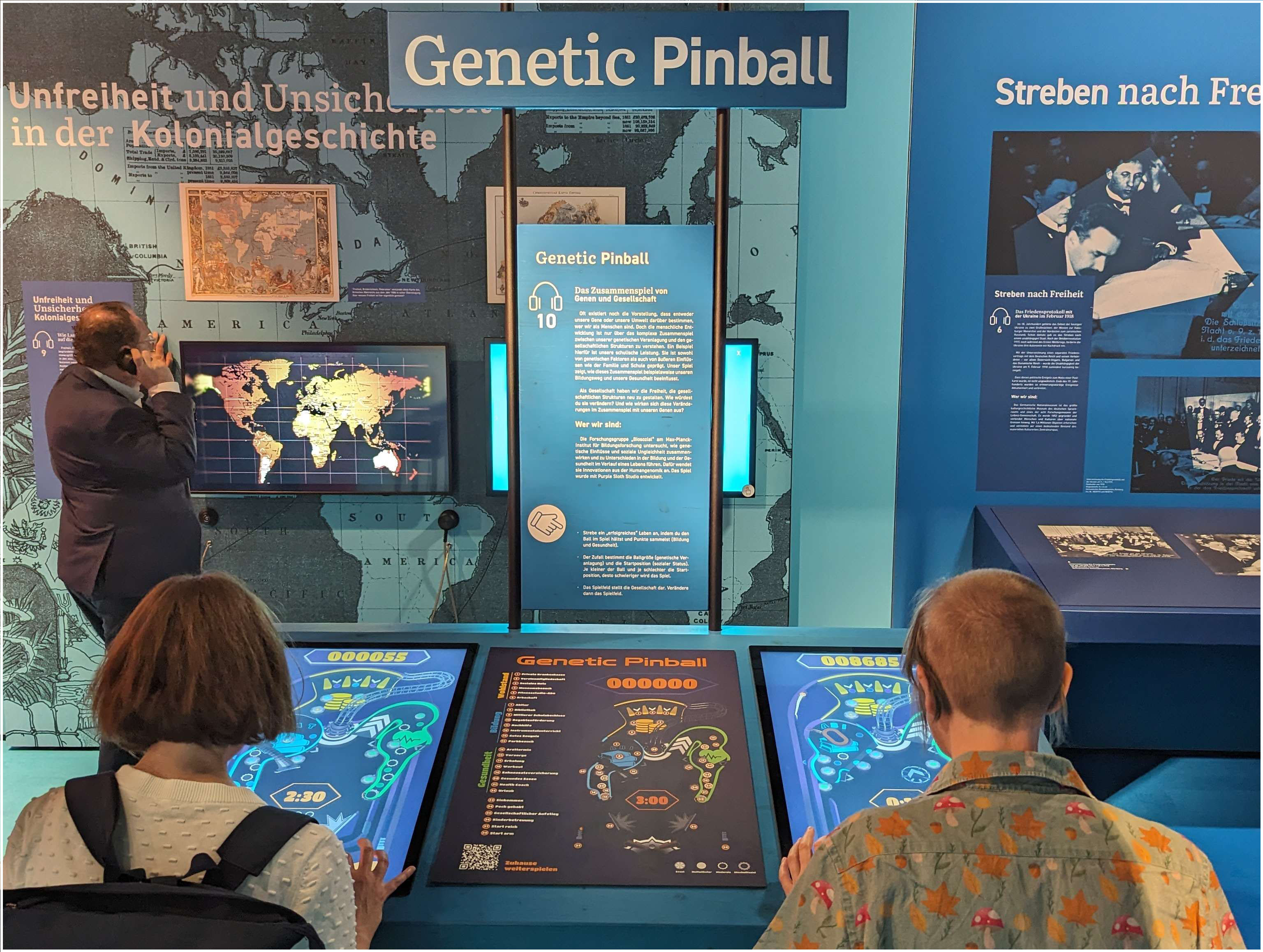Creating Genetic Pinball
Devlog
Yesterday we published our latest Project Genetic Pinball. In this devlog we want to explore what made this project special, but also share some of the challenges we had to tackle along the way.
The Exhibition
Genetic Pinball is a project commissioned and based on research by the Max Planck Institute for Human Development. It was developed for the MS Wissenschaft Tour 24 a floating science exhibition, built into the belly of a 100 meter long ship that will visit over 30 locations in Germany and Austria over the coming months.

The Game
Based on imagery employed in a research paper, Genetic Pinball explores the interaction between genetic disposition, socio-economic factors and the society we live in. From the beginning it was pitched to us with three central educational objectives in mind:
- both genetic disposition and environmental factors shape the experiences and difficulties we face over the course of our lives
- the way society interacts with both of these classes of parameters substantially changes our experience
- we can change society
Over the course of several months we were able to work with our partners at the Institute to refine the initial pitch into a working prototype and in the end a finished game and were very happy to be able to try it out at the exhibition.
For all those not able to visit the MS Wissenschaft the game is available for free right here on itch.
Learnings: Localization
One aspect that proved more challenging than anticipated was the localization. We've done localization into English, German, French, Spanish, Polish, Portuguese, Dutch, Turkish and Simplified Chinese before and our partners at the Max Planck Institute were able to provide the actual localization, so we were confident it shouldn't prove too much of an issue.
What we hadn't anticipated was Unitys nonexistent native support for Arabic and RTL languages in general. Luckily there is https://github.com/pnarimani/RTLTMPro, which did a lot of the work for us, but even with the help of this plugin it still took much longer than anticipated for us to make everything work.
What remains is the frustrating realization that one of the largest game engines in existence does not even have basic support for a set of languages that is spoken by hundreds of millions of people around the globe.
Design Challenges
A key challenge we faced during the project was the task of transporting complex social institutions and system such as the health or education sector into a pinball board and made them react to the parameters that were being explored.
One of the earliest ideas was using holes that balls were more or less likely to fall through depending on their size (a proxy for genetic disposition) in order to represent people falling though the cracks of a system. This led to us raising the sectors from the base layer of the pinball board, which would also come in handy when replacing the segments later on.
Apart from size the other randomized property a ball is spawned with is its starting position, which serves as a proxy for the socio-economic background. A wealthy start grants immediate access to the prosperity segment, providing an opportunity to obtain one of several powerful boons, making the game easier. Afterward, it directs the player into the education segment. Conversely, a poor start places the player in the center of the board, where they are almost immediately at risk of losing, and the access to one of the segments can only be achieved by a well aimed shot.
From this we quickly identified two parameters we could tweak in order to create variants of segments that were more or less equitable: The number of holes in a segment determines how punishing a smaller ball size is while its accessibility changes how powerful the rich start is compared to the poor one.
Limitations
With only 2 variants of each segment, the game can only begin to allude to the changes that are possible in order to shape a more just society. Some fundamental systemic properties, such as the existence of one rich and one poor starting condition, are unchangeable within the game. Similarly, the graduation certificate (ABI in German) or aptitude test (SAT in English) is present in all variants. This is not meant to imply that these institutions or structures are unalterable, but rather a concession to the somewhat limited scope in which a pinball game can explore this analogy.
At its core, even the most equitable state that can be produced within the game is still deeply flawed and in need of societal change. But in a way this might be quite fitting as truly liberatory progress frequently requires more creative and radical change than merely choosing between two predefined options.
Final Thoughts
As a studio, we are especially interested in working on games that explore how the medium is able to examine social and political conditions. As such it was a great joy to work on such a meaningful project, and we are especially excited to hear from people who can experience the game as part of the exhibition or in the comfort of their own home.
We are tremendously thankful to the folks at the Max Planck Institute for Human Development, whose initiative and enthusiasm for the project created this opportunity in the first place.
We hope you all enjoy the game. Cheers
Purple Sloth Studio
Get Genetic Pinball
Genetic Pinball
| Status | In development |
| Author | PurpleSloth |
| Languages | Arabic, German, English, Turkish |

Leave a comment
Log in with itch.io to leave a comment.